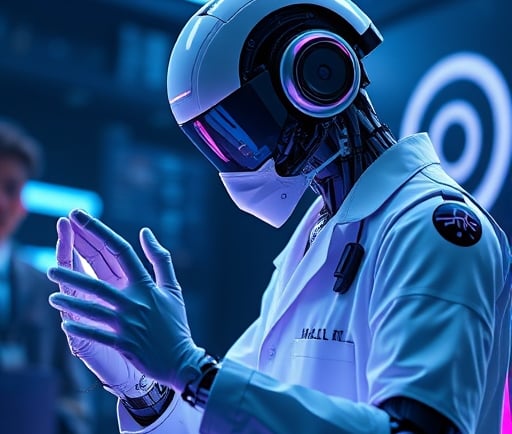AI Surgeons: The Future of Precision Medicine
Explore how AI-powered robots are reshaping surgeries with unmatched precision, transforming healthcare accessibility and outcomes.
INNOVATIONTRENDINGEDUCATION


The integration of artificial intelligence (AI) into healthcare is revolutionizing medical procedures. Among its most transformative applications is the rise of AI-powered surgical systems, which promise to redefine precision medicine and reshape patient outcomes worldwide.
AI surgeons are robotic systems designed to perform or assist with complex surgical procedures. They leverage advanced machine learning algorithms, real-time data analysis, and robotics technology. These systems enable surgeons to operate with unmatched precision, minimizing human error and ensuring faster patient recovery times.
How AI Surgeons Work
AI surgical systems utilize a combination of high-definition imaging, data analytics, and machine learning. They analyze vast amounts of medical data, such as patient records and imaging scans, to guide decision-making during surgeries. With features like autonomous or semi-autonomous functionality, these robots can execute tasks such as suturing, incisions, and tissue removal with unparalleled accuracy.
#### Real-World Applications
One of the most prominent examples is the da Vinci Surgical System, used globally for minimally invasive surgeries, such as prostatectomies and hysterectomies. Surgeons control the robot through a console, ensuring precise movements in otherwise inaccessible areas.
More recently, researchers have been exploring autonomous surgical robots. For instance, the Smart Tissue Autonomous Robot (STAR) has demonstrated success in autonomous soft-tissue surgeries, outperforming human surgeons in some tests. These innovations hold immense potential to make procedures safer and more efficient.
Benefits of AI in Surgery
- Enhanced Precision: Robots can make micro-movements far steadier than a human hand, reducing damage to surrounding tissues.
- Improved Patient Outcomes: AI systems help decrease the risk of complications, leading to faster recovery times and shorter hospital stays.
- Accessibility: Remote surgery, where a surgeon operates a robot from another location, can make expert care accessible in underserved regions.
- Efficiency for Healthcare Systems: By minimizing errors and optimizing surgeries, AI surgeons can help reduce costs and alleviate overburdened healthcare facilities.
Challenges and the Road Ahead
Despite its promise, the widespread adoption of AI surgeons faces challenges, such as high implementation costs, the need for extensive training, and ethical concerns around accountability in case of errors. However, as AI technology evolves, these obstacles are expected to diminish.
What’s Next?
The field of robotic surgery continues to advance rapidly. Autonomous suturing robots and real-time AI guidance systems are under development. Experts believe that in the next decade, AI surgeons will become a standard part of operating rooms, bringing us closer to the era of fully automated precision medicine.
AI-powered surgical robots are not just the future—they are already here, transforming healthcare as we know it. With continued innovation, these systems are set to make surgeries safer, faster, and more accessible for all.
